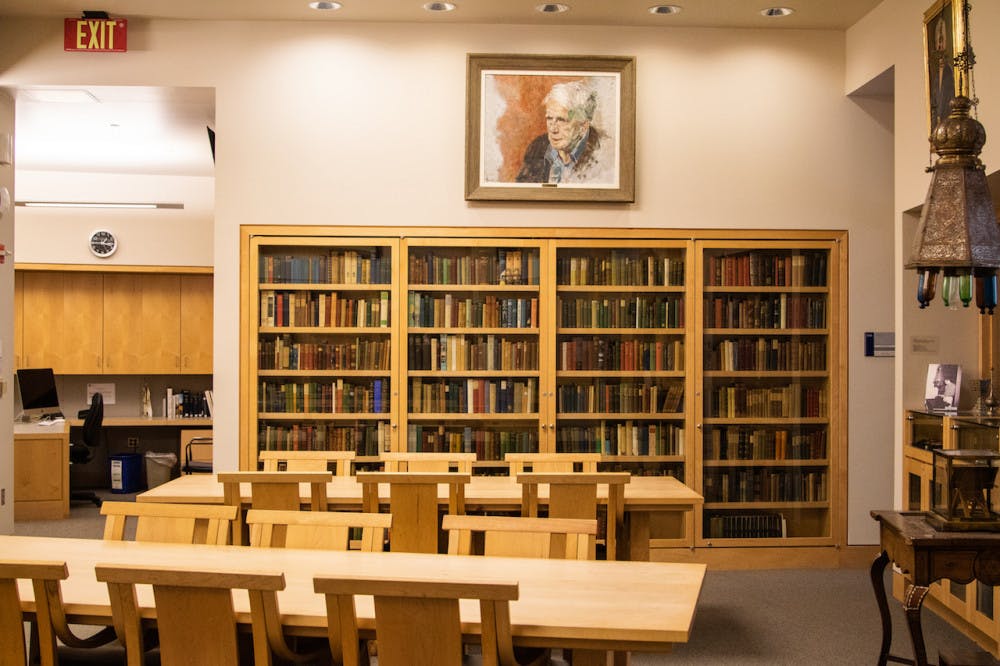[gallery ids="43497,43498,43499"]
The doorway that separates the lower level of Davis Family Library from Middlebury’s Special Collections is rather unassuming, considering it is the entrance to a space that contains some of the college’s most prized material belongings. It is rather like a certain pub in Harry Potter that is visible to witches and wizards while Muggles walk past every day without turning their heads.
“We often meet students in their senior year who have never come down here,” said Rebekah Irwin, the director of Special Collections. “This is a really secure space: it’s both a temple and a prison. We’re behind locked doors and we have special security systems, so that can be quite intimidating and can feel a bit privileged.”
Indeed, the hyper-secure space located under Wilson Café is a fascinating juxtaposition between temple and prison. In a space that contains two first editions of Whitman’s Leaves of Grass and books written over 400 years ago, the intimidation of interacting with Special Collections is undoubtedly warranted. To enter the space and to engage with the materials, however, is a priceless experience that is available to anyone who asks.
“We try to be as open as possible,” Irwin said. “That’s one of our challenges — making sure that this feels like a space that students can come to.”
Though its closed-off appearance may be daunting, however, the discovery of Middlebury’s Special Collections and Archive feels like the discovery of an ancient ruin, an oasis tucked away in a desert of bleary eyes and blue recliners.
“In Special Collections, we adhere to the idea that an artifact itself can teach us something and speak to us in a way that a digitized copy cannot,” Irwin said. “Digitalization is great and can do all sorts of things like a keyword search, but we like to think that side-by-side, the two complement each other. When you see a book that was held by an antislavery activist in the United States in 1850, it gives you a sense of the experience and the lives lived at that time.”
To Irwin, Special Collections is an opportunity to learn about the past with the aid of physical objects. If nothing else, the collection is a space created to humor the visceral response humans have when holding documents and articles held by other humans centuries in the past. Its existence, furthermore, is a testament to the importance of history and the humanities at Middlebury College.
“Recently in the news there have been these stories of the catastrophic declines of humanities majors in colleges across the United States, and some people have worried that studying history has become an exclusive privilege,” explained Irwin. “But when you have a historical view, you can see that the fights we are still fighting today have been going on for decades, and you can learn from them and win battles that are still ongoing. We can see that through lenses of race, sexual identity and gender. Without that, you feel like the battles today have no historical precedence, and you try to fight them without any ammunition that’s been learned from the past.”
Though Special Collections exists to teach Middlebury students about the past, Irwin has been tasked with focusing on the preservation of the present for future students.
“We need to collect as much as possible to tell our stories,” she said. “How we preserve the past is changing, and we don’t exactly know what it will look like to study the history of Middlebury College fifty years from now. We just had a class in that was looking at when the first student organizations and clubs for LGBT life and African American life emerged. We had newspapers and some meeting notes, but no student organizations take meeting minutes anymore. We don’t know the answer to how history will be preserved going forward.”
Through the uncertainty, however, Irwin believes that people will continue to create physical items that can ultimately end up in the archive.
“We try to collect things off of bulletin boards. Students still make lots of posters,” she said. We try to actively collect those and other things that capture the events on campus. I don’t see a time when students will stop making posters.”
Even if they do, Irwin is confident that Special Collections will find a way around digital obstacles.
“I hope that it will always be important to express political and cultural ambitions physically, through t-shirts and water bottles, because we can collect all of that,” she said. “And though the physical material may slowly go away, we hope that something will take its place. We hope that a student will still be able to search on [the Special Collections] Instagram pages 25 years from now to get a sense of what student life was like.”

Ariadne Will ’22 is a local editor for the Campus.
She has previously served as a staff writer, where she covered topics ranging from Middlebury’s Town Meeting to the College’s dance performances.
Will also works for her hometown newspaper, the Daily Sitka Sentinel, where she covers tourism and the Sitka Planning Commission.
She is studying English and American literature with a minor in gender, sexuality and feminist studies.




